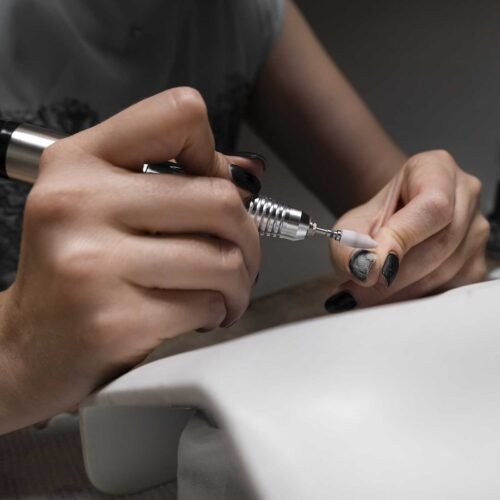
- September 10, 2023
- 8:59 pm
- 433
Nowadays, you may commonly come across different types of artificial nails since they are very popular and largely used by women for fashion purposes. There are various types of fake nails such as acrylic nails, wrap nails, gel nails, press-on nails and others. Even though the use of artificial nails is increasingly common, there are still a lot of misconceptions about fake nails. Today we will give an explanation of the differences between different types of fake nails with their pros and cons. If you’re wondering about using artificial nails, this article is the one to read.
Acrylic Nails and How To Do It
Among different types of fake nails, acrylic nails are the most popular. To create acrylic nails, technicians blend two elements monomer and polymer, then apply the mixture over the natural surface of nails with a specialised brush. Afterwards, all you have to do is rest your nails and let the acrylic dry down. This time, you can shape your artificial nails into any shape that you like.
Pros and Cons of Acrylic Nails
Acrylic nails are durable with good bonding ability. To nail technicians, it’s very convenient and easy for them to apply. The affordable price is another advantage that you may find out with acrylic nails. What’s more attractive than having a decent nail enhancement that can last long without paying too much?
However, acrylic nails are inconvenient in some ways. They are heavier than other artificial nails, so you may feel uncomfortable when using them. Besides, as heavy chemicals are used to create acrylic nails, they will smell during the process of applying or soaking off.
Gel Nails and Its Procedure
If you want a natural-looking manicure with and glossy surface, gel nails would be the appropriate choice. Gel nails are created in the same method as acrylic nails, but using gel builder to apply over the nail surface instead of the polymer-monomer mixture, then let it dry under UV light.
Pros and Cons of Gel Nails
Gel nails have lighter weight and release little smell during applying or removal process. Using gel nails, you will feel more comfortable, and your nails have a natural looking.
Despite obvious advantages, gel nails are more expensive and easy to be lifted. It’s not very popular in some areas of the country, so sometimes it might be difficult to get a gel nail service. Besides, gel nails may be very harmful to the health. Some customers may have allergic actions to gel nails when the skin around cuticles gets tendered and itchy. Getting nails also creates a lot of fine dust that might not be good for health.
Wrap Nails and How To Do It
Unlike previous artificial nails, wrap nails are made from similar materials such as linen, fibre, and silk. Wrap nails are formed by many layers of silk, powder, and glue. Linen, fibre or silk is cut into required shapes, and then glued over the surface of natural nails. Wrap nails will be the solution, which helps to strengthen the weak nail tips.
Pros and Cons of Wrap Nails
Wrap nail is the oldest type of fake nail and is not available in many nail salons today. They are light and harmless to health as releasing no dust or chemical fume. However, wrapped nails might cause open pores, making a favourable environment for fungus and other bacteria.
In conclusion, acrylic nails are still the most appropriate choice of artificial nails. Nowadays, nail technicians can put a gel coat on top of acrylic nails to give them a glossy looking of gel nails yet still keeps all the pros of acrylic nails.
Related posts

Popular Nail Stamping Techniques
- September 10, 2023
- 7:59 pm
- 381

Mistakes and Myths About Gel Polish
- September 8, 2023
- 7:48 pm
- 583
- 1
